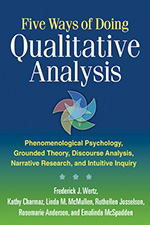Frederick J. Wertz

Professor Emeritus
Email: [email protected]
In 2020, I retired from Fordham University and have moved to Michigan and remain engaged as Professor Emeritus. I continue to teach courses and mentor dissertations in various universities, offer workshops, collaborate on research projects, serve APA governance on the Council of Representatives, and practice psychotherapy on a limited basis.
-
- 1973 - BA, Beloit College, Psychology Major
- 1974 - MA in Psychology, Duquesne University
- 1982 - PhD in Psychology, Duquesne University
Dissertation Title: Dialog with the New Look: An historical critique and a descriptive approach to everyday perceptual process. (Mentor: Amedeo Giorgi)
-
- Research methodology
- Qualitative and mixed methods
- Philosophical foundations of psychology
- Phenomenological and existential psychology
- Psychological theory
- History of Psychology
- Humanism
- Psychoanalysis
- Science studies
- Indigenous psychologies
-
- Foundations of Psychology
- Qualitative Research Methods for Psychology
- Psychoanalytic Theories
- Philosophical Foundations of Psychology
- The Freudian Case History
- Supervision and Consultation
- Psychology and Human Values
- Sport Psychology
- Supervision of Psychotherapy Externs
-
- Distinguished Contributions to Qualitative Inquiry Award, American Psychological Association, Division of Quantitative and Qualitative Methods (5), 2019.
- Faculty Award, Alpha Sigma Lambda Honors Society, Fordham University Chapter, 2017.
- Council of Representatives, American Psychological Association (APA), elected by the Society of Theoretical and Philosophical Psychology (24), APA, 2017-2019.
- President, Society for Qualitative Research in Psychology, a section of the Division of Quantitative and Qualitative Methods (5), American Psychological Association, 2016-2017.
- President-Elect, Society for Qualitative Research in Psychology, a section of the Division of Quantitative and Qualitative Methods (5), American Psychological Association. 2015-2016.
- The Rollo May Award, for independent and outstanding pursuit of new frontiers in humanistic psychology, by the Society for Humanistic Psychology of the American Psychological Association, 2014.
- Section Representative, Society for Qualitative Inquiry in Psychology, Executive Board of Division of Evaluation, Measurement and Statistics (5), American Psychological Association, 2013-2015.
- President, Interdisciplinary Coalition of North American Phenomenologists (ICNAP), 2011-2014.
- Fellows Chair, Society for Theoretical and Philosophical Psychology, American Psychological Association, 2012-2013.
- Fellow, American Psychological Association, with Fellow status in the Society for Theoretical & Philosophical Psychology (24) and the Society for Humanistic Psychology (32) (since1995) and the Divisions of General Psychology (1) and Evaluation, Statistics and Measurement (5) (since 2013).
- Editor in Chief, Journal of Phenomenological Psychology, 1993-2010.
- Distinguished Service Award, The Society for Theoretical and Philosophical Psychology of the American Psychological Association, 2007.
- Executive Board (Secretary), American Psychological Association Society for Humanistic Psychology (Division 32), 2005-2011.
- Outstanding Professor and Mentor Award, Graduate Student Association, The Graduate School of Arts and Sciences, Fordham University, 2006
- President, Division of Theoretical and Philosophical Psychology, American Psychological Association (24), 1998-1999.
- President, The Society for Humanistic Psychology of the American Psychological Association (32), 1994-1995.
- Phi Beta Phi Honor Society, Fordham University Chapter, since 1988.
- Walter H. Bingham Fellow, Beloit College, 1973. Awarded annually to the outstanding graduating psychology student.
For a complete list, please see CV.
-
- Wertz, F.J. (in press). Objectivity and generality in psychological science: The value of explicating fundamental methods. Qualitative Psychology.
- Kamens, S.R. † & Wertz, F.J. (in press). Chapters 1-8 & 10. In S.R. Kamens (ed.), Reconceptualizing Schizophrenia: Urhomelessness and Transcultural Phenomenology. New York: Routledge/Taylor & Francis Publishing.
- Hu, B.† & Wertz, F,J. (2019). In and out of exile: An integrative phenomenological understanding of Attenuated Psychosis Syndrome. Psychosis, DOI: 10.1080/17522439.1693613. http://doi.org/10.1080/17522439.1693613
- Wertz, F.J. (2018). Qualitative methods as fundamental tools: Autonomy and integration in mixed-methods research. In B. Schiff (Ed.), Situating qualitative methods in psychological science. Routledge/Taylor & Francis Publishing.
- Wertz, F.J., Desai, M.U., Maynard, E., Morrissey, M.K., Rotter, B., & Skoufalos, N.C. (2017). Research methods for person-centered healthcare science: Fordham studies of transcendence and suffering. In M. Englander (Ed.), Phenomenology and the social foundations of psychiatry, pp. 95-120. London: Bloomsbury Publishing.
- Wertz, F.J. (2017). A case of spirituality without belief. InterViews: An Interdisciplinary Journal in Social Sciences, 4(1), 82-88.
- Desai, M.U., Wertz, F.J., Davidson, L., Karasz, A. (2017). Regaining good in the world: What matters to persons diagnosed as depressed in primary care. Mental Health in Family Medicine, 13, 381-388.
- Wertz, F.J. (2016). Outline of the relationship among transcendental phenomenology, phenomenological psychology, and the sciences of persons. Schutzian Research: A Yearbook in Lifeworldly Phenomenology and Qualitative Social Sciences, 8, 139-162.
- Levitt, H. M., Motulsky, S. L., Wertz, F. J., Morrow, S. L., & Ponterotto, J. G. (2016, November 7); Recommendations for Designing and Reviewing Qualitative Research in Psychology: Promoting Methodological Integrity. Qualitative Psychology. Advance online publication. http://dx.doi.org/10.1037/qup0000082/
- Mattson, M., Wertz, F.J., Fogerty, H., & Zibriskie, B. (Eds.) (2015). Carl Jung in the Academy and Beyond: The Fordham Lectures of 1912. New York: The Spring Press.
- Wertz, F.J. (2015). Phenomenology: Methods, historical development, and applications in psychology. In J. Martin, J. Sugarman, and K. Slaney (Eds.), The Wiley Handbook of Theoretical and Philosophical Psychology. Hoboken, NJ: Wiley.
- Wertz, F.J. (2015). Jung’s Break with Freud Revisited: Research Method and the Character of Theory in Psychoanalysis. In M. Mattson, F. Wertz, H. Fogerty & B. Zibriskie, B. (Eds.), Carl Jung in the Academy and Beyond: The Fordham Lectures of 1912. New York: The Spring Press.
- Wertz, F.J. & †Olbert, C. (2015). The convergence of Freud’s psychoanalysis and Husserl’s phenomenology on a research approach for human sciences. In R. Brooke, C. Fischer, & L. Laubscher (Eds.), Invitation to psychology as a human science. Pittsburgh, PA: Duquesne University Press.
- Wertz, F.J. (2015). Humanistic psychology and the qualitative research tradition. In K.J. Schneider, J.F. Pierson, & J.F.T. Bugental (Eds.) The handbook of humanistic psychology: Theory, research, and practice. Newbury Park, CA: Sage Publications.
- Wertz, F.J., Charmaz, K., McMullen, L., Josselson, R., Anderson, R., McSpadden, E. (2011). Five ways of doing qualitative analysis: Phenomenological psychology, grounded theory, discourse analysis, narrative research, and intuitive inquiry. New York: Guilford Press.
- Wertz, F.J. (2010). The method of eidetic analysis for psychology. In T.F. Cloonan & C. Thiboutot (Eds.), The redirection of psychology: Essays in honor of Amedeo P. Giorgi, pp. 261-278. Montréal, Québec: Le Cercle Interdisciplinaire de Recherches Phénoménologiques (CIRP), l’Université du Québec à Montréal et Rimouski.
For a complete list, please see CV: All publications are available on request.
(† indicates student co-author)

Wertz, F.J., Charmaz, K., McMullen, L., Josselson, R., Anderson, R., McSpadden, E. (2011). Five ways of doing qualitative analysis: Phenomenological psychology, grounded theory, discourse analysis, narrative research, and intuitive inquiry. New York: Guil